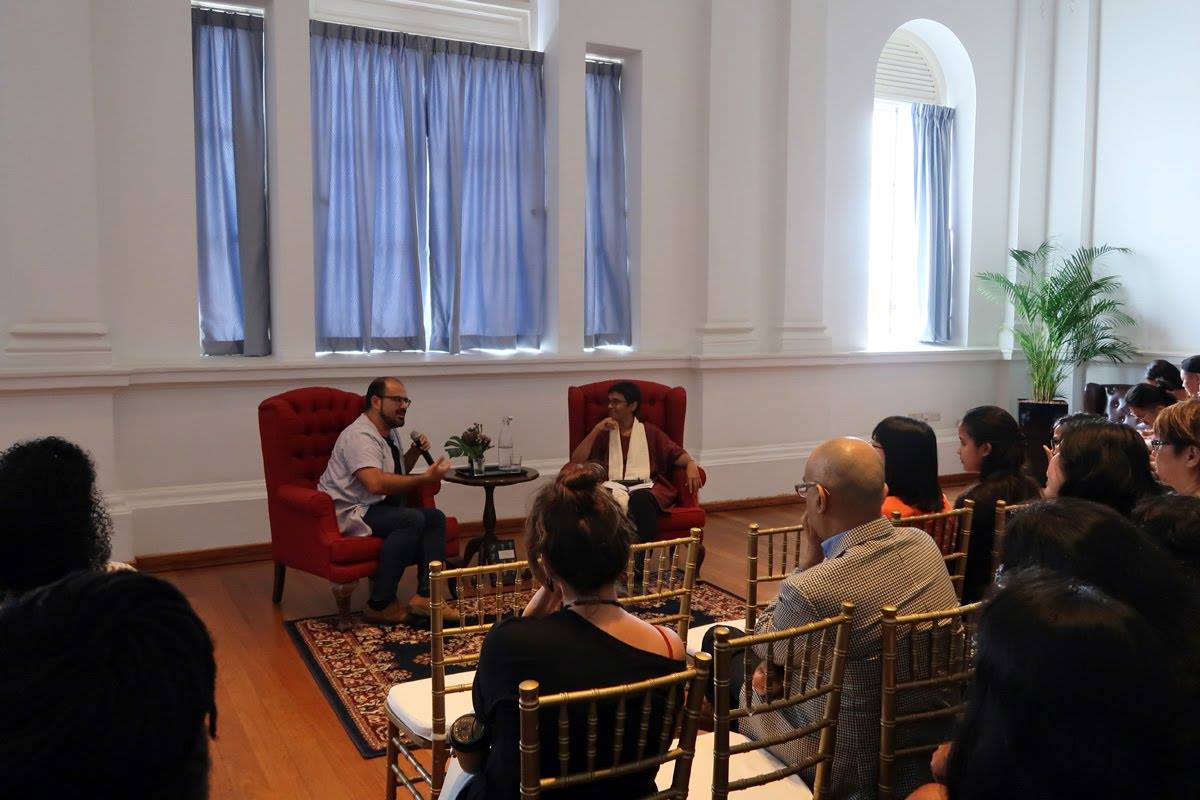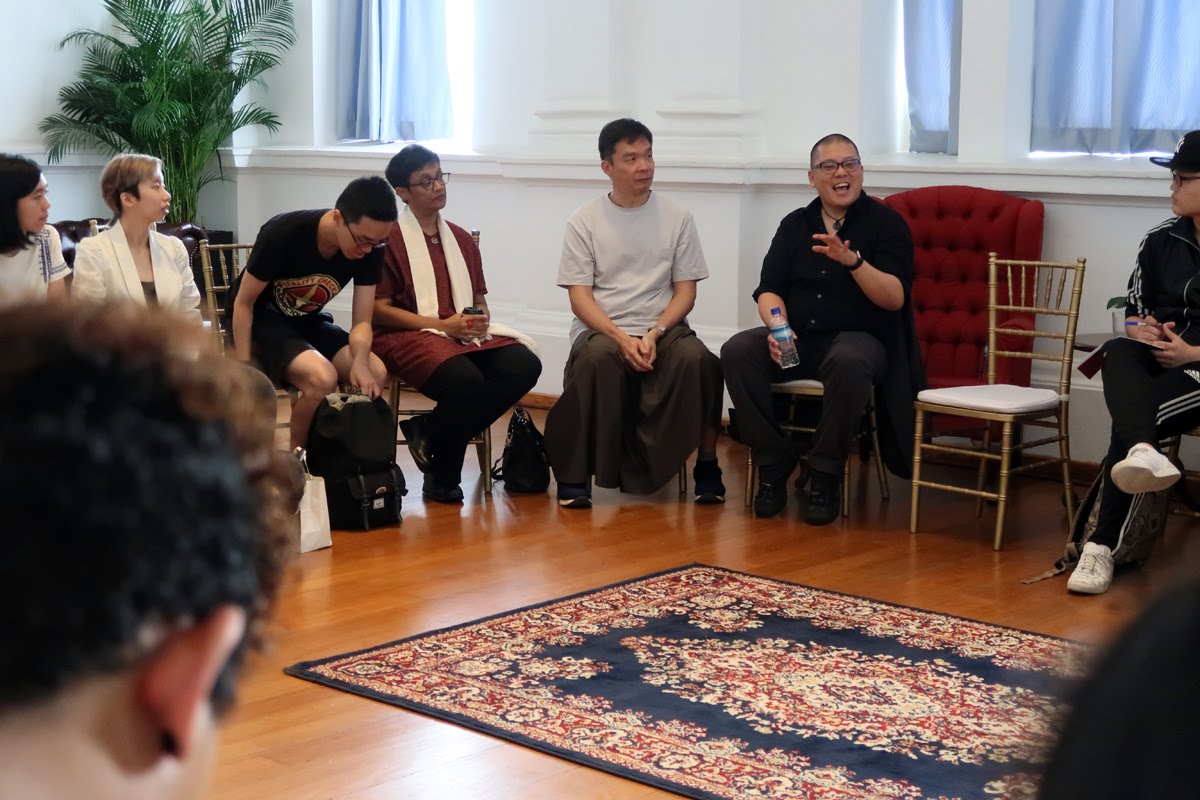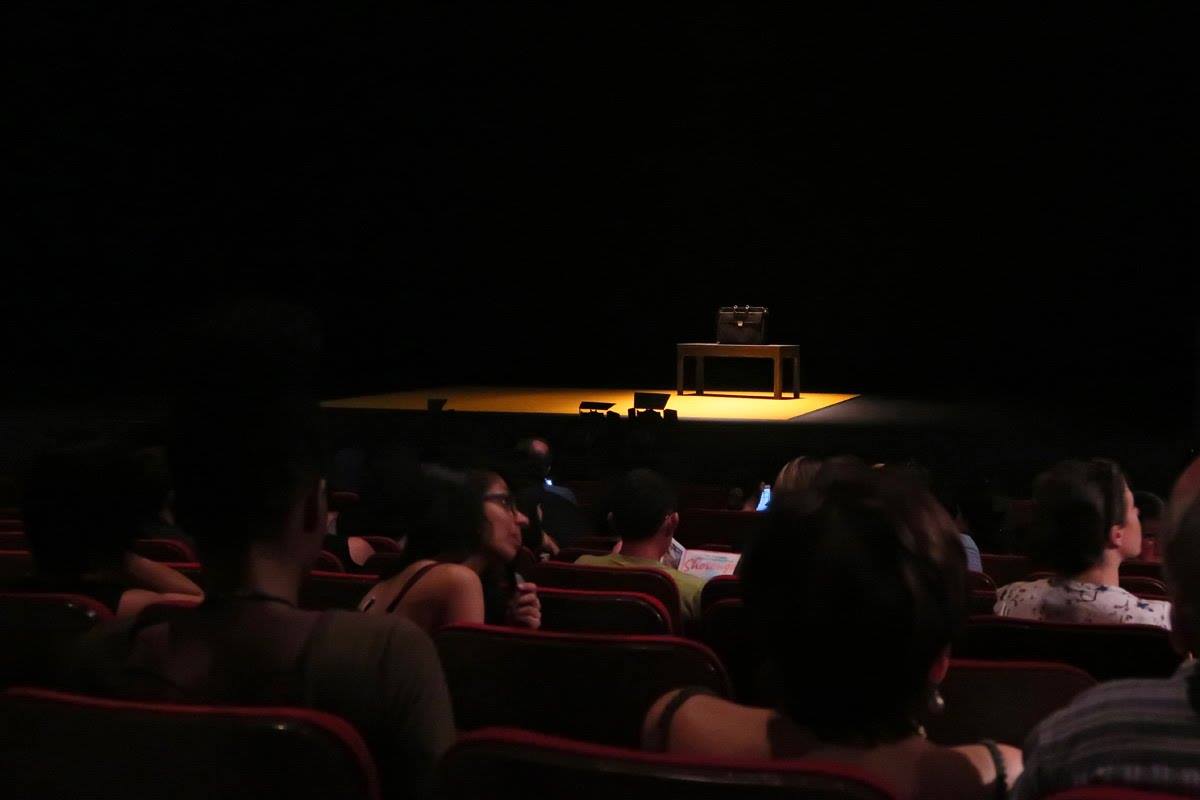Charlene Rajendran in conversation with Amer Hlehel, creator and performer of TAHA.

Day 2 Activities:
- In Conversation with Amer Hlehel
- Dialogue with Eric Ting
- SIFA Performance: TAHA
“Theatre is about recreating worlds - you need trust,” TAHA’s playwright-performer Amer Hlehel said in the Festival House Blue Room. “You need trust in the director, the designers, the stage crew. It may be a one-man show, but it is the people around that make it happen.”
TAHA is a monologue about the life of late Palestinian poet Taha Muhammad Ali, who is celebrated for poetry – which he only began writing at the age of 52 – about upheaval and loss in a war-torn region.
Hlehel was responding to a question about trust in performance making from Points of View (POV) Facilitator Charlene Rajendran, whom he was in dialogue with in a public session attended by POV Performance Making track (P/M) participants.
Hlehel originally wrote and performed TAHA in Arabic, but later created an international version of the monologue with his trusted director and friend Amir Nizar Zuabi. The pair worked on translating portions of the Hlehel’s text into English. They also workshopped the play with American-based Singaporean playwright Chay Yew, to redevelop TAHA for audiences not familiar with Palestinian culture.
Hlehel remarked that rehearsals for TAHA with Amir required few words as one knew exactly what the other was thinking. It allowed them to skip over relationship-building and move straight into creative development. “You trust your director and he trusts you,” he put simply.
Commenting on the session, Dominic Nah agreed: “Trust is fundamental, but sometimes overlooked when we fuss over the details of performance making and performance development.”
Hlehel found a personal impetus for creating the monologue in Taha’s writing: “Through Taha’s poetry, I understood my grandfather’s pain.”
But as the production traveled beyond the Middle East, Hlehel found greater purpose in bringing the story of the Palestinian people to foreign audiences.
“We had an innocent, boring life; now we’re just headlines,” he said matter-of-factly. “Let the world rediscover us as humans.”
But he was clear that TAHA was intended to highlight the human costs of conflict and displacement, yet leave space for various interpretations and perspectives. “Good art asks questions, but doesn’t have the answers,” he concluded.
Hlehel also spoke passionately about theatre’s “primitive” – he clarified he meant it in a positive way – capacity for bringing people together: “We all go into a journey of imagination and truth... People are building the story with you.”
"He kept emphasising how the role of the artist is to bring truth and love, and to be sincere, open and honest," Shanice Nicole Stanislaus said. "It's a good reminder for everyone in the room."
Eric Ting, director of Octavia E. Butler’s Parable of the Sower, said something quite similar to Hlehel later that afternoon: “My goal [in theatre] is to continue the exploration of what it means to be strangers in a room together, taking a journey that is both discomforting and revelatory. How do we be in a room together with people not like us? That’s the only way forward.”

The POV participants got to engage Parable of the Sower director Eric Ting in dialogue.
In a private dialogue with POV participants, Ting also brought up the topic of trust in artistic collaboration, specifically with Parable’s creator Toshi Reagan and her team: “Toshi is a deeply loyal human being... Toshi puts together a company of people that, for her, are the people who speak most directly to who she is. And there are members of the company who have worked with Toshi forever and ever.”
Ting shared with the POV participants how Parable had begun its life as songs – a whopping 80 to be exact – inspired by Octavia Butler’s novel, written by Reagan and her mother, noted singer and activist Bernice Johnson Reagan. After a successful concert of these songs in 2015, the pair was approached to turn the songs into an operatic adaptation of the book. Ting was brought in at this juncture.
Speaking on the challenges of creating a stage adaptation of a huge literary work like Parable, Ting said: “The experience of a novel is a very personal and private one, where you sit down and read a book. You can put it down and pick it up, or you can go back, you can review. Problem with the theatre is that [it] does not give you the time to rewind a moment. You have to sit through the two hours or so of time.”
Explaining the racial politics behind the artistic decisions made, Ting was keen to stay true to Reagan’s original vision and the production’s musical origins and African American heritage.
“It was really about the music,” he said. “This is Toshi’s love letter to the book.”
Commenting on the dialogue session with Ting, Gabbi Ayane said: “I feel like the process behind Parable was quite unique and I appreciated that he was so open and candid in sharing the work’s development and the sense of community within the team.”
Zac Denver Lee concurred: “I had a lot of confusion during the show but all was resolved during the dialogue... [It gave] me a clearer picture of choice making, which I’m focusing on for this POV programme.”
The day came full circle as the P/M group headed to KC Arts Centre to attend TAHA. On a nearly-bare stage with just a bench, Hlehel’s sincere and charismatic performance as Taha received a standing ovation.

The simple stage of TAHA.
I’m really impressed by how truthfully Hlehel told the story of Taha,” Chia Xin Ying commented. “He had such a deep connection with the poet.”
“TAHA was the best show I’ve seen this year,” Nathaniel Tan said emphatically. “Hlehel is outstanding in telling a story that needed to be told... It was personal, dynamic, and bore truths that resonated so deeply it shocked me. This was all I wanted from theatre.”
POV continues with Day 3.
Published: 6 May 2018